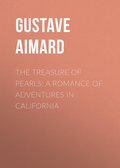
Gustave Aimard
The Queen of the Savannah: A Story of the Mexican War
"What does my brother want?" he asked in a guttural voice.
Don Melchior was not troubled. In spite of his interned emotion, his face remained calm and stoical.
"Good," he said in Comanche, a language which he spoke perfectly. "My brother was asleep. Is that the way in which he watches his prisoners?"
"The Opossum is not asleep," the Indian said haughtily. "He knows the importance of the duty entrusted to him."
"If he is not asleep, how is it that he is ignorant the hour has arrived when I am to take his place?" the young man continued.
"Is it so late? I have not heard the hoot of the owl."
"Yet it has been sounded twice. Good, my brother is tired; let him go and sleep, while I watch in his stead."
The Indian had no reason to doubt what Don Melchior said to him. Besides, he was really desirous of sleep, and was not sorry to catch up a few hours' rest. Hence he made no remark, but quietly surrendered his post, and five minutes later was lying by the side of his comrades fast asleep.
This last alarm had been serious, although Don Melchior had bravely gone through with it. Still his agitation was so great, partly to regain his coolness, he remained quiet for nearly a quarter of an hour before he ventured to enter the prisoners' room. At length he did so. Doña Emilia, seated in a corner, was holding her daughter's head on her lap.
"Who's there?" she asked, with a sudden start.
"A friend," the young man answered in a low voice. Doña Diana sprang up.
"Don Melchior!" she cried.
"Silence," he said, "silence, in heaven's name."
"Oh! I was certain he would come," the young lady continued, as she walked towards him.
"Thanks, Melchior," Doña Emilia said, as she offered him her hand. "Thank you for coming; however terrible my situation may be, your presence here is an immense consolation."
"Have you come to deliver us, Melchior?" the maiden continued.
"Yes," he answered simply, "such is my object; and believe me, señorita, all that a man can do, I will."
"What," Doña Emilia asked, "are you alone?"
"Alas, yes; but what matter?" Doña Diana fell back on her bed.
"Flight is impossible," she murmured with despair.
"Why so?" the young man continued boldly, "Have I not contrived to get in here alone?"
She shook her head sadly.
"Yes," she said; "but you were alone."
Don Melchior sighed, for he understood the meaning of the remark.
"Why despair?" Doña Emilia exclaimed, starting up impetuously. "We are three now. The Indians tremble at the sight of me, and we shall succeed in escaping."
"Mother, mother," the girl said entreatingly, "dismiss that thought. Alas! Flight is impossible, as you know well. Melchior is as well aware of it as we are."
The young man hung his head.
"If I cannot save you, señorita," he answered, "I can die with you."
"Die with us!" she exclaimed impetuously. "Oh no, that must not be, I insist."
"It was my hope in coming here," he said.
"Very good, Melchior," Doña Emilia said; "but cease to fear for us. The Indians will not dare, I feel firmly convinced, to make an attack on our lives, in spite of their frightful threats."
"Mother, undeceive yourself, our death is resolved. It is close at hand, for the conditions offered us compel us to die."
"That is true," Doña Emilia murmured despondingly. "Great God, what is to be done?"
"Fly," Don Melchior exclaimed boldly.
"No," the young lady continued, "the plan is impracticable, and it would be madness to dwell on it. If you have reached us by a miracle, it is impossible for you to convey us through the Indian camp and pass the sentries unseen. It would be precipitating our death instead of checking it."
"It is well, señorita," Don Melchior said, leaning his shoulder against the wall. "Since you refuse to attempt to fly, I shall come back to my first resolution."
"What is it?"
"To die with you."
The young lady took a step forward, and turned to Doña Emilia.
"Do you hear, mother?" she exclaimed in agony. "Do you hear what Don Melchior says? I will not have him die. Order him to go away."
"Why should I order him?" Doña Emilia coldly replied. "Don Melchior has ever been devoted to us. He has come to die with us, and neither you nor I have the right to prevent him."
"I must, I tell you, I must."
"And why so, my child?"
"Why?" she repeated, wild with grief. "Because, mother, I love him, and will not have him die!"
Doña Emilia stood for a moment as if annihilated by the sudden revelation of this love, which she suspected, though unwilling to believe in it. A reaction took place in her, and she laid her hand on the young man's arm.
"Go, Don Melchior," she said in a gentle voice, half choked by sobs. "My daughter loves you, and will not have you die."
"Thanks, thanks, mother!" the maiden exclaimed, as she fell into her arms, and hid her face in her bosom.
"Oh, let me, let me die with you!" Don Melchior said, clasping his hands imploringly.
"No," Doña Emilia repeated, "you must leave us."
"The night is getting on; I implore you, Melchior to be gone!" the maiden exclaimed.
The young man hesitated, and a violent combat took place in his heart.
"It is your wish," he muttered, with hesitation.
"In the name of our love, I command you!"
"Your will be done. Bless me, madam, for I shall return, and for your sake attempt impossibilities."
Doña Emilia wiped away the tears that ran down her cheeks against her will.
"Bless you, my son!" she said, in a voice choked by sobs. "God alone knows the future, Melchior. I thank you for not having deserted us. Embrace your betrothed; perhaps this first kiss will be the last."
The two young people fell into each other's arms.
"And now, farewell," Doña Emilia continued. "Begone, you must begone!"
Don Melchior tore himself with difficulty from the maiden's clasp.
"Oh, not farewell!" he exclaimed, his eyes sparkling with hope. "We shall meet again," and he tottered out of the room.
"Mother, mother," Doña Diana said, throwing herself wildly into Doña Emilia's arms, "oh, now I wish to die!"
"Poor child!" her mother murmured, as she covered her with kisses. "Take patience; we have but a few hours longer to suffer."
CHAPTER XXXVII.
THE AMBUSH
THE provost marshal recognized the inutility of further search, and, despairing of recapturing the fugitive, whom he supposed to be hidden in the irregular masses of rock that bordered the stream, collected his men, and gave them orders to close up, after bidding them keep the prisoner's escape temporarily a secret, as he himself intended to tell the general what had occurred when the latter asked at his hands the prisoner confided to him. An hour later he entered the canyon, and rejoined the main body of the army.
General Sandoval, although he had nearly twenty thousand men under his orders, perceived, almost immediately after he invested Coahuila, that with soldiers like his, badly armed, worse disciplined, and completely deficient in the necessary articles for a regular siege, he would never succeed in storming a town defended by a garrison of veteran troops, and commanded by one of the best generals of the Spanish army. He therefore converted the siege into a blockade, contenting himself with cutting off the enemy's communications with the interior, and hoping finally to reduce him by famine.
But about this time he received a despatch from General Iturbide. After informing him fully of the events that had occurred, which had, in a few days, changed the state of affairs, and destroyed the power of Spain throughout the entire viceroyalty, the general told him that the Spaniards now held but two points on the Mexican territory – the fortress of San Juan de Ulúa, near Veracruz, and the town of Coahuila. Ulúa but slightly troubled the new chief of the Mexican government.
The Spaniards, shut up in the fortress, and completely cut off from the seaboard, even supposing that they held out for a long time, could not by any possibility exert any influence over the affairs of the country; but the case was not the same with Coahuila. The intendancy of which this town was the capital was one of the richest in Mexico. Being mountainous and well wooded, a clever leader of partizans could collect the malcontents, whose number was large, organize guerillas, and carry on the war, till the Spanish government recovered from its stupor and tried to seize again the rich colonies which had only just slipped from its grasp.
Now, such a skilful chief was invested at Coahuila at this very moment. He had a numerous and well-disciplined garrison, sufficient to form the nucleus of an army which would soon become formidable if time were allowed for its organization. Hence it was absolutely necessary to finish with this general by capturing him, and cutting up his troops.
On perusing this explicit and positive despatch, General Don Pelagio Sandoval found himself no little embarrassed. General Iturbide gave him to understand that he trusted entirely to him, that he had accomplished things far more important than this, and the provisional government felt assured he would carry it through honourably. For two days the general remained plunged in deep thought, forming a dozen plans, and rejecting them in turn. He could not dream of attempting an assault, and carrying the town by storm when opposed by adversaries like the Spaniards. Don Pelagio only saw one way of success: it was to compel General Cárdenas to leave the town, lay a trap for him, and force him into a surrender.
The idea was certainly good; but what stratagem should he employ to cheat General Cárdenas, and draw him out? The general was not the man to let himself be caught in a clumsy snare. He would immediately scent it, and the Mexicans would have to begin over again, under greater difficulties than at first, as the enemy would be on his guard. At last, after long hesitation, Don Pelagio decided on a plan of unexampled temerity, and which must infallibly succeed through its sheer audacity, if matters were carried out with prudence.
Taking advantage of a frightful storm that raged over his camp and the town, and rendered the darkness of night denser still, he ordered his troops to leave the encampment in small detachments, giving each leader of a corps detailed instructions about the movements he must make and the spot he was to go to, and remained himself to the last, to make sure of the due execution of his orders. As it was necessary that the Spaniards should believe in a precipitate flight, rather than a retreat, he was obliged to leave behind him the larger portion of his guns and ammunition, certain, were he the victor, of finding it all intact, but resolved, like the gambler who risks his whole fortune on a card, to blow out his brains if he were conquered, for he knew that Iturbide would not forgive him a defeat.
Moonshine, the Canadian, thoroughly instructed by the general, and who, in his careless gaiety, only thought of playing the Spaniards a famous trick, was left behind to induce the enemy to nibble. We have seen in what manner the Canadian performed the delicate task.
The spot where Don Pelagio proposed waiting for the Spaniard was excellently adapted for a surprise. It was a canyon, or defile, about three leagues in length, and so narrow that two horsemen could scarce ride side by side. This canyon, like most of those found in these latitudes, was merely a dried up watercourse, produced by an earthquake. It formed countless angles and turns, so close to each other that it was impossible to see anything ahead save the wood covered sides of the canyon, which rose precipitously to an enormous height It was evident that if the Spaniards were so mad as to enter this defile, they might perish to the last man, without a chance of resistance.
The Mexicans, on reaching the canyon a little before sunrise, had plenty of time to prepare for action. General Pelagio had all the heights crowned and established his troops in unassailable positions. These measures were taken with such skill and prudence, that this spot where, at the moment, more than four and twenty thousand men were assembled, seemed completely deserted, and it would have been impossible, within a pistol shot, to see the barrel of a single gun glisten. If the Spaniards, from the spot where they had halted on the riverbank, could perceive nothing, it was not the same with the Mexicans. Not one of the enemy's movements escaped Don Pelagio. When he saw the long columns of the Spanish army arrive on the riverbank the Mexican chief quivered with joy. His stratagem had succeeded, his calculations were just, and, as he had expected, his enemy, deceived by the feigned retreat, was about to deliver himself into his hands.
A man must have himself experienced the feelings of a lucky player, who gains a decisive game, in order to understand the full extent of the delight which filled the Mexican general's heart. Still, he felt a moment of indescribable anxiety and agony when he saw the enemy halt on the bank of the stream, and remain there so long quiescent. He feared for a moment lest the Spaniards, guessing the trap laid for them, would turn back. All in that case would be left to the chances of a battle in the open with an experienced enemy accustomed to conquer, and who would, doubtless, contest the field warmly. But this apprehension soon faded away when the scouts crossed the ford. The decisive moment was at hand, and the Mexicans prepared seriously for action.
"My friends," the general said to the persons who surrounded him, "here are the last relics of the troops of those who have oppressed us for three centuries. God has reserved for us the glory of fighting the last battle which will sully the sacred soil of our country with bloodshed. All our brothers have their eyes on us; they ask victory at our hands; shall we disappoint them?"
"No!" the soldiers, electrified by these generous words answered as one man.
"Swear to conquer!" the general continued.
"We swear it!" they exclaimed enthusiastically.
"It is well! I hold your promise, and God has heard it. ¡Méjico e independencia! Each to his post now, for blood is about to flow!"
The officers hastily returned to the positions assigned to them, the soldiers lay down on the grass with their finger on the trigger, and all awaited with palpitating hearts the signal for action. At this moment the two detachments sent forward as scouts separated. Captain Castilla halted while Captain Obregozo formed his columns of attack, and continued his forward march.
When the captain, resolved to carry out his duty thoroughly, entered the defile, a few well-aimed musket shots sufficed to destroy his weak escort, and the officer himself fell with a bullet through his chest. This brave officer was the first victim of this day, so fatal to the Spanish army. Unhappily, many others were fated to follow him. When the second detachment, which hurried up to the aid of the first, followed into the defile, the combat assumed the proportions of a battle.
Unhappily, the Spaniards having no infantry, and covered by invisible foes, fell one after the other with cries of impotent rage. On all sides bullets hailed on them, against which they had no protection, and were unable to reply. At times, a bullet, aimed haphazard, or guided by destiny, reached an object it was not aimed at. The shrubs parted, and a corpse rolling down the precipice fell crushed at the feet of the horses.
But for one man the Mexicans lost the Spaniards lost fifty. The fight was too unequal; it was no longer a combat, but a butchery. Suddenly, a tremendous shout was heard; the earth trembled beneath the hoofs of nearly two thousand horses, and General Cárdenas appeared, his face inflamed with noble ardour, his hair in disorder, leaning over his saddle, with his right arm extended, and his sword hanging from his wrist by a steel chain. Behind him came the whole Spanish army – the real battle was about to begin. The infantry arrived at the double on the flanks of the column, firing into the bushes and shrubs where they saw shots fired. The Spanish general, as an experienced leader, had made the best of a bad position. He had scarce entered the canyon with the cavalry, ere a large infantry corps, facing front and rear, occupied the gorge with two guns levelled on the plain. The general rightly conjectured that his enemies might try to catch him between two fires, which was really the plan of the Mexicans; for, no sooner had the infantry occupied the allotted post than Don Aurelio Gutiérrez, at the head of a considerable body of troops, infantry and cavalry, darted suddenly from the forest which had hitherto concealed him, and dashed furiously on the Spaniards, in order to dislodge them and drive them into the interior of the defile.
An obstinate hand to hand fight at once began. Here, at least, the combat was equal; for the Spaniards could see their enemies. Unhappily, the sharpshooters, concealed behind bushes, covered and decimated them, being most desperate against the artillerymen, whom they mercilessly shot down each time when they went up to reload their guns.
General Cárdenas, in spite of all obstacles – the bullets, lumps of rock, and whole trees showered down on his troops – crossed the whole defile with the rapidity of an arrow. He then perceived, some distance ahead, a barricade erected by the Mexicans to intercept his passage.
"There is the road, boys," the general shouted;
"Forward, forward!"
All dashed on to clear the barricade, but suddenly a battery was unmasked, and death passed along the Spanish ranks. Four howitzers, loaded with canister, thundered simultaneously, sweeping down whole lines of horsemen, and making a bloody gap through the entire column. Two-thirds of this magnificent Spanish cavalry were laid low. The general, lifting his horse with a prodigious effort, had forced the noble animal to mount the face of the barricade.
"Forward!" the general shouted, brandishing his sword over his head and digging his spurs into his horse's belly.
The animal made a last generous effort, and rolled dying in the centre of the Mexicans. General Cárdenas was already on his feet, sword in hand.
"Surrender, surrender!" a numbers of soldiers shouted, as they rushed toward him.
"Nonsense! Does a Spanish general ever surrender?" he said, with a gloomy smile of contempt.
And, whirling his formidable sabre round his head, he drove back the men who had ventured too near him.
"Stop, stop!" Oliver Clary shouted, as he dashed forward. "By heaven, he is a noble soldier; let us grant him the death of a brave man. Defend, yourself, General."
"Thank you, señor," the general replied with a smile; "I expected nothing less from your courtesy."
"A fair fight. Back, señores," the hunter said.
"No, no," a man suddenly shouted, as he hurried to the front. "You are a foreigner, Señor Don Oliver; allow me to settle this quarrel."
The Canadian turned and recognized Don Aníbal de Saldibar.
"Very good," he said, lowering his point with a gesture of respectful deference.
"Do you accept me as an adversary, General?" the hacendero asked.
"I care little whom I fight, señor," the general replied haughtily.
"On guard, then!"
The two blades crossed with a portentous clang. There was something grand and chivalrous in this singular duel in the midst of a battle. The two adversaries, however, had no fear of being separated. The Mexicans had suddenly stopped. As for the Spaniards, decimated by the canister, and discouraged by the loss of their chief, they fought without any order, more for the purpose of selling their lives dearly than in the hope of conquering.
Don Aníbal and General Cárdenas carried on the duel they had so bravely commenced, while the Canadian and other officers kept back the spectators. The general was a very skilful swordsman, but, wearied by the violent exercise he had been taking, and rendered desperate by the probable defeat of his troops, he was not sufficiently master of himself to contend advantageously against an adversary of the strength of Don Aníbal. In a very short time he fell, run through the body. They rushed forward to help him; the general attempted to rise. For the last time, he waved his sword defiantly, and raised to heaven his eyes already glazed with death.
"Long live Spain!" he shouted in a powerful voice, and he fell back. He was dead, like a soldier should die, sword in hand. The battle was won. Of five thousand men that composed the Spanish army, hardly fifteen hundred survived. The Mexicans had conquered, more through the strength of their position and the madness of their enemy, than through their skill and courage. Perhaps, though, it was the will of God, who, in His omniscience, had marked this day as the last of the Spanish rule in Mexico.







